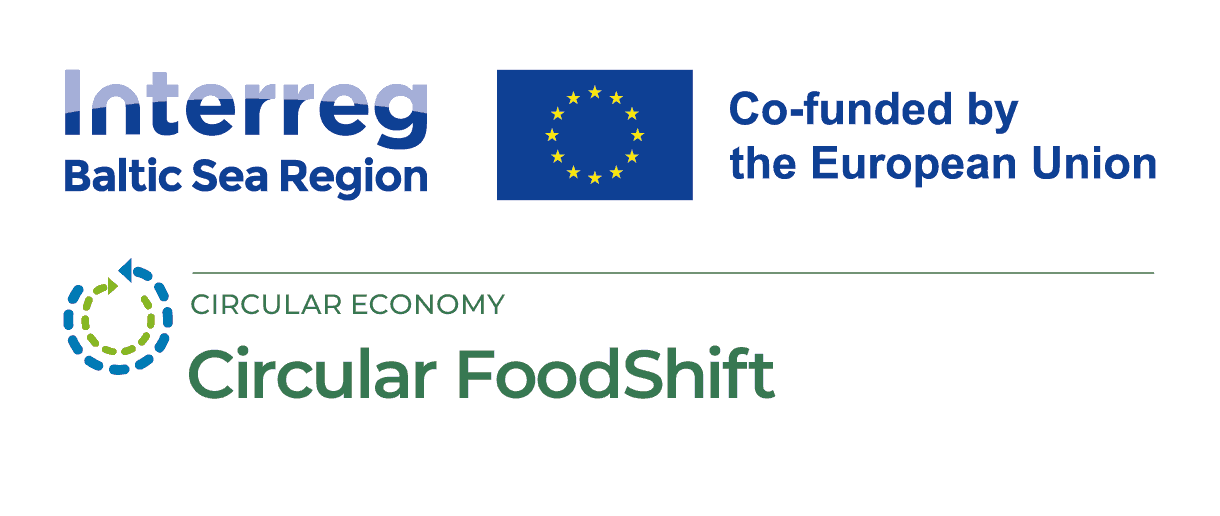Webinar: Dynamic food procurement in Skåne region
Project: Circular FoodShift
Virtual Meeting
29. October 2025
09:30 - 11:00 (CET)

Various regional municipalities across the Baltic countries have put food waste reduction and circular economy as a priority in their long term regional strategic plans. However, it is a challenge too complex for a single sector to solve alone, and cross-sector partnerships are vital for advancing a circular economy in food systems.
Through the transnational cooperation, we developed and tested several cross-sectoral strategic approaches, facilitated capacity building and stakeholders’ engagement activities, and fostered stronger collaboration between schools, organic farmers, procurement specialists, professional chefs and municipalities in shaping circular food systems aligned with the EU Circular Economy Action Plan.
What is circular economy for food?
A circular food system represents an innovative approach to how food is produced, consumed, and managed. This model aims to eliminate waste and actively regenerate natural ecosystems, moving away from the conventional “take-make-dispose” pattern.
Deliverables and outputs
Achievements
The procurement focused activities engaged over 40 procurement specialists and agencies, small food producers, and municipal representatives.
Thanks to the Circular FoodShift project, one of the district municipalities in Vilnius region integrated dynamic food procurement in their school food procurement system, and established a short supply chain agreement with the organic farm cooperative EKO Market LT, to provide healthy and local food to kindergartens and elementary schools in Ukmerge district.
The food education program, “Making the School Community Food-Wise”, engaged 5 schools in Tartu County to co-develop student-centred food systems. This program has supported the creation of a long-term vision for a sustainable school food system by promoting circular economy for food principles. As a next step, the program will be tested in 5 more schools starting autumn of 2025.
The School Chefs’ Masterclasses in Latvia trained 43 chefs and catering professionals with practical tools for sustainable and zero waste cooking. This training method has also helped to connect school chefs from different regions and schools, and enabled the exchange and knowledge between them to continually improve and revitalise school menus.
The international vocational school webinars trained 40 educators from Estonia, Latvia, Lithuania, and Finland in integrating circular food principles into culinary and hospitality education.
The collaborative paper, “Local and Circular Food System in Baltic Countries“, offers a research-based perspective on the region’s green transition and showcases key examples of systemic innovation. By involving the target- and stakeholder groups in and outside the project regions, the project tackled several challenges that are key to advancing food systems' sustainability; essential cross-sectoral involvement, exchange between regions, increased collaboration and having a common goal and vision from municipalities.
Read the story here, and if you've missed it, listen to the Circular FoodShift Talks – podcast episodes.
Project: Circular FoodShift
Virtual Meeting
29. October 2025
09:30 - 11:00 (CET)
Project: Circular FoodShift
Virtual Meeting & Physical Meeting
20. June 2025
16:00 - 17:00 (EEST)
Project: Circular FoodShift
Virtual Meeting
04. June 2025
09:30 - 11:30 (CEST)
Project: Circular FoodShift
Physical Meeting
13. - 14. May 2025
Project: Circular FoodShift
Physical Meeting
18. March 2025
10:00 - 13:00 (EET)
Project: Circular FoodShift
Virtual Meeting
12. March 2025
10:00 - 13:00 (EET)
Project: Circular FoodShift
Virtual Meeting
07. March 2025
14:00 - 15:30 (EET)
Project: Circular FoodShift
Physical Meeting
07. March 2025
09:00 - 16:00 (EET)
Project: Circular FoodShift
Virtual Meeting
04. March 2025
10:00 - 11:15 (EET)
Project: Circular FoodShift
Virtual Meeting
23. January 2025
15:00 - 16:30 (EET)
Project: Circular FoodShift
Virtual Meeting
27. November 2024
15:00 - 16:30 (EET)
Project: Circular FoodShift
Physical Meeting
22. October 2024
12:00 - 16:00 (EEST)
Project: Circular FoodShift
Physical Meeting
17. October 2024
10:00 - 16:00 (EEST)
Project: Circular FoodShift
Virtual Meeting
09. October 2024
10:00 - 13:00 (EEST)
Project: Circular FoodShift
Virtual Meeting
01. October 2024
10:30 - 12:30 (EEST)
Project: Circular FoodShift
Physical Meeting
06. July 2024
19:00 - 20:00 (EEST)
Project: Circular FoodShift
Virtual Meeting
04. June 2024
15:30 - 17:00 (EEST)
Project: Circular FoodShift
Physical Meeting
14. - 15. May 2024
09:00 - 16:30 (EEST)
Project: Circular FoodShift
Physical Meeting
14. May 2024
16:30 - 19:30 (EEST)
Project: Circular FoodShift
Virtual Meeting
08. May 2024
15:00 - 16:30 (EEST)
Project: Circular FoodShift
Virtual Meeting
25. April 2024
15:30 - 16:30 (EEST)
Project: Circular FoodShift
Virtual Meeting
20. March 2024
15:00 - 16:30 (EET)
Interactive map showing pilot locations. Use the arrow keys to move the map view and the zoom controls to zoom in or out. Press the Tab key to navigate between markers. Press Enter or click a marker to view pilot project details.